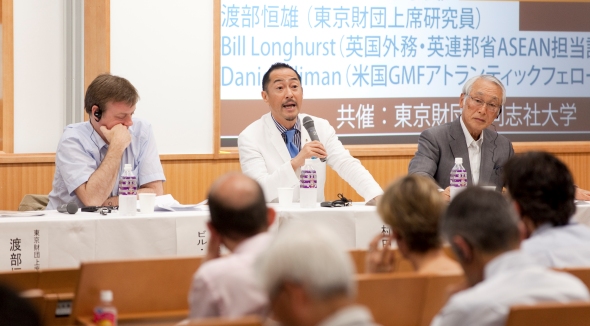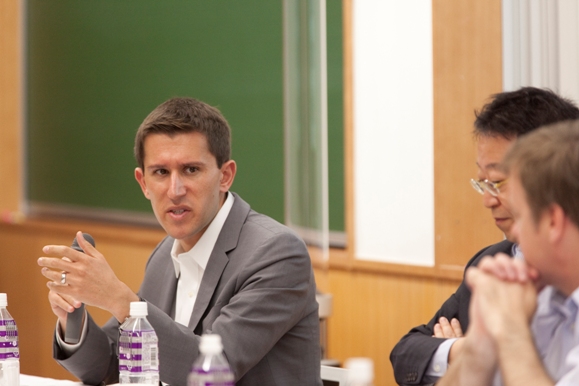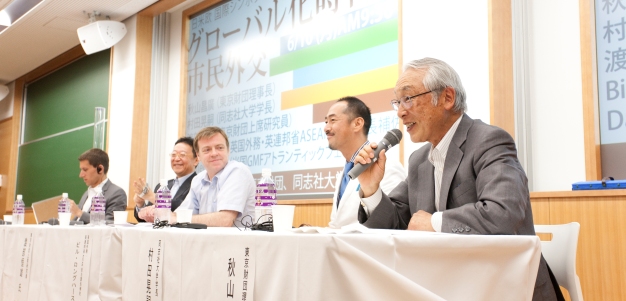- Article
- Other
Citizen Diplomacy in the Age of Globalization: Japan-US-Europe Symposium on Kyoto’s Heritage in a Globalizing World
August 28, 2013
“Citizen diplomats” in the nongovernmental sector can augment the job of professional civil servants—especially when government relations grow tense—and become effective spokespersons for efforts to bring about positive change in society.
These views were expressed during a public Japan-US-Europe symposium co-hosted by the Tokyo Foundation and Doshisha University in Kyoto. The symposium, held on the Doshisha campus on June 10, 2013, brought together participants of Trilateral Forum Tokyo—a closed-door meeting among Japanese, US, and European policy experts—and some of Kyoto’s leading innovators who are drawing on the ancient imperial capital’s heritage and modern technology to pioneer new industries and markets.
The second Trilateral Forum Tokyo—co-organized by the Tokyo Foundation and the German Marshall Fund of the United States—attracted some 70 leading scholars, think tankers, journalists, government officials, and business representatives from Japan, the United States, and Europe for a Track 1.5 conference over the weekend of June 8–9 in Minato-ku, Tokyo, to explore avenues for further trilateral cooperation and to discuss issues in the Asia-Pacific regional architecture.
Communication with a Purpose
“Diplomacy is communication with a purpose,” commented Bill Longhurst, deputy head of the ASEAN Department in the UK Foreign and Commonwealth Office, during the Kyoto’s symposium’s first session focusing on “Citizen Diplomacy in the Age of Globalization.”
“We conduct diplomacy to influence or persuade people, to negotiate with them, and equally important, to learn from them,” said Longhurst, who was recently named the next UK ambassador to Cambodia. “A diplomat who spends his time just pushing out their own government’s messages is not doing his job. A key factor is to receive as much as one transmits.”
He identified three types of diplomacy: traditional diplomacy conducted by foreign service personnel; digital diplomacy, which reaches out directly to citizens; and citizen-to-citizen diplomacy, where professional “middle men” are left out. Noting that the last of the three is least developed, Longhurst commented that it can also be “potentially problematic” when it is conducted for “pernicious purposes or less than wholesome objectives.”
In traditional diplomacy, he said, “We send diplomats to embassies to talk to host government officials and a range of other organizations.” This is needed just as much today, as in the past, he noted, “with all the global challenges we face.”

A more recent trend is digital diplomacy, which takes advantage of new technologies. “It means more than just having a website,” he said. “It’s about being interactive. The UK embassy in Cambodia started a Facebook page last year, and within a few months, we had 40,000 followers. Interestingly, when we posted what we thought was exciting news about the UK acceding to a treaty of friendship with the ASEAN region, barely anyone noticed. But when we put articles about the Olympic Games or the queen’s Diamond Jubilee, we had a huge reaction: over 6,000 likes, 1,500 comments, and 324 shares, compared with just 16 likes for the story about the treaty.”
“The sheer speed and reach with which communication can take place through online diplomacy,” he added, “means that this is the form for the future.”
A less developed form of diplomacy is that conducted among private citizens. There is great potential for such initiatives, Longhurst said, as when a movement called Make Poverty History came together at the G8 summit in 2005 to put pressure on governments to do more to help the people of Africa to relieve debt.
There can be problems, though, he said. “Radicalization is a pernicious form of citizen diplomacy that can impact on the professional diplomacy as well. An unknown American pastor named Terry Jones announced he was going to burn the Koran live on the Internet, and this developed into a huge diplomatic incident involving the US secretary of state. The furor caused by the Muhammad cartoons in a Danish newspaper in 2005 is another example,” he noted.
Longhurst expressed the hope that better forms of citizen diplomacy would be promoted, perhaps with online translation tools helping to fill the communication gap—such as between Japanese and Korean citizens—so ordinary people can do more to take matters forward and encourage friendlier relations where official dialogue is at an impasse.
“If Mayors Ruled the World”
Kyoto is an ideal place to think about issues like citizen diplomacy, noted Doshisha University President Koji Murata, being outside the greater Tokyo area and yet part of a sizable metropolis in the Kansai district—centered on three cities with contrasting features: Kyoto, Osaka, and Kobe. Viewing global issues from outside the national capital in a city with its own identity like Kyoto, he noted, can provide new insights from the perspective of common citizens.
Having been the imperial capital for over a millennium, Kyoto today is also home to many innovative startup companies. It has 36 universities, despite its population of just 1.45 million, “So it’s a city of universities,” Murata said. “In fact, students make up a tenth of the city’s total population. It’s a place where citizen diplomats of tomorrow are being nurtured.”
One of the first universities to be built in the city was Doshisha, he noted. The city’s role as a center of education was one factor that saved it from decline when the emperor moved to Tokyo—taking the nation’s capital with him—following the Meiji Restoration in 1868.
A hallmark of a good citizen diplomat is pragmatism, Murata explained, noting that it is also a key attribute of mayors. Referring to a book by Benjamin Barber of the City University of New York called If Mayors Ruled the World , Murata posited that a less acrimonious and politicized world might result if municipal leaders became the chief actors in global governance, making decisions through a world parliament of mayors.
“Barber notes that mayors are natural spokespersons for the people, since 70 percent of the world population lives in cities,” he said. “Most global-scale issues, including climate change, also emanate from urban areas. At the same time, mayors would be less preoccupied with advancing national or political agendas and would focus on the practical needs of individual citizens, potentially bringing big changes to global governance. As former New York Mayor Fiorello La Guardia once quipped, ‘There is no Democratic or Republican way to fix a sewer.’”
At the same time, Murata noted, local governments would need to establish a more flexible organization and broaden their horizons, training municipal workers to adopt global perspectives. “Government officials shouldn’t be the only ones spearheading a shift to a more locally focused and pragmatic global governance, and this is where civil society, academia, and private citizen diplomats should play an increasingly bigger role.”
The Evolving International Order
Trilateral Forum Tokyo in itself is an important initiative in citizen diplomacy, noted Tokyo Foundation Senior Fellow and Director of Policy Research Tsuneo Watanabe. In addition to encouraging dialogue on pressing global issues among experts in Japan, the United States, the Forum, in 2012, helped link the civil societies of the three regions by taking Forum participants to Iwate, Miyagi, and Fukushima—the three prefectures hit hardest by the March 2011 earthquake and tsunami.

“We covered a broad range of themes over the past two days,” Watanabe said of this year’s sessions in Tokyo. “We addressed China’s rise and the future of the international order; TPP and the global trading order; the future of innovation in industrial development; the nuclear programs of North Korea and Iran; future directions in foreign aid; energy and resources, a hot topic with most of Japan’s nuclear reactors off line; and the future of Myanmar, which has had close ties with Japan and is also very important for the US and Europe.”
Despite the diversity of the topics covered, “China, interestingly, came in all the sessions,” Watanabe said. “This shows how big China’s presence has become and how concerned the global community is about whether China is going to adhere to the existing rules of the international order. Nobody wants to turn China into an adversary, and we all want to encourage China to become a responsible stakeholder.”
The sessions took place just as Presidents Barack Obama and Xi Jinping were holding their summit in California. “One of the topics we discussed was cyber security, which was also discussed at the summit,” Watanabe explained. “A cyber attack on essential infrastructure could seriously disrupt the life of a nation, but there are as yet no international rules for dealing with such an eventuality.”
Watanabe also reported that a number of private businesses have had their digitized intellectual properties stolen. “To prevent such cyber thefts, some companies are keeping their most important innovations in analog form.”
Referring to Murata’s remarks about municipal leaders playing a bigger role, “We’re already seeing that statements by mayors can have global repercussions,” Watanabe said, taking note of Osaka Mayor Toru Hashimoto’s controversial comments about the military’s use of prostitution, which caused a backlash not only locally but also affected Japan’s relations with the United States, South Korea, and China. “This,” he said “has made international relations very complicated, but it also highlights the growing importance of citizen diplomacy.”
Enduring Networks among Future Leaders
Recalling his days spent at Doshisha in 2004-05 on a Fullbright fellowship, GMF Transatlantic Fellow Daniel Kliman pointed out that students, too, can play an important role as citizen diplomats. “I was a student of Murata sensei at a seminar,” he noted, jokingly adding that the nomikai (drinking parties) among the seminar participants were a very good introduction to citizen diplomacy and very productive for US-Japan relations.”
He identified four types of citizen diplomats, the first being scholars and think tankers. “In today’s world, governments are very much stretched for time and resource, and they often lack long-term horizons, thinking only weeks or days ahead,” Kliman said. “Scholars and think tankers can get around politics and government hierarchies, cross-cutting the lines of bureaucratic responsibility to go straight to key decision makers, as well as generating ideas and frameworks that governments can then take up.”
They are also better positioned to discuss politically sensitive topics. “At the Forum we talked about US-Japan-South Korean relations, which is a critical trilateral relationship to build up but can be difficult for historical reasons.”
Another type of citizen diplomat, Kliman said, is private-sector leaders. “Large trade agreements, such as the Trans-Pacific Partnership in the Asia-Pacific and the Transatlantic Trade and Investment Partnership between the US and Europe, will be the key defining issues in the coming years. There are many domestic interests, though, that don’t want to see these agreements move through, so it’s incumbent on business leaders in the US, Japan, and Europe to make the case to their publics that the agreements are in their own interests. If the negotiations are to truly succeed, business leaders will have to step up as citizen diplomats.”
Kliman agreed with Murata about the role of urban leaders—the third type of citizen diplomat. “Some mayors are arguably better than others, but Murata sensei is absolutely right in saying that cities need to play a more global role. They are the locus of economic activity, and cities across the world also face common challenges, such coming up with new engines of economic growth, aging and diversifying populations, building resiliency in the face of climate change and large-scale natural disasters, and achieving energy efficiency.”
The fourth and perhaps the most important type of citizen diplomat is students, Kliman said. “Going abroad and participating in Fullbright and other programs is so critical—even with the rise of social media—because there’s no substitute to face-to-face relationship building. These scholarships have created enduring networks among future leaders that can help shape diplomatic and other government policy. The knock-on effect” of nurturing future citizen diplomats “is critical to developing the next generation of urban leaders, private-sector leaders, and scholars.”

* * *
The Kyoto program’s second session on “Cultural Heritage as a Modern Innovation” focused on the resurgence of several traditional industries. Moderated by Professor Yuzo Murayama of the Doshisha University Graduate School of Business, the session featured presentations by Masao Hosoo, president of a textile company founded over three centuries ago that has successfully struck a chord among modern consumers worldwide with the distinctive quality of its fabrics; yuzen dye artist Yunosuke Kawabe, and renowned composer and percussionist Stomu Yamash’ta.
Session 1: Citizen Diplomacy in the Age of Globalization
Speakers:
• Koji Murata (President, Doshisha University)
• Bill Longhurst (Deputy Head, ASEAN Department, UK Foreign and Commonwealth Office)
• Tsuneo Watanabe (Director of Foreign and Security Policy Research and Senior Fellow, Tokyo Foundation)
• Daniel Kliman (GMF Transatlantic Fellow)
Moderator:
• Masahiro Akiyama (President, Tokyo Foundation)
Session 2: “Cultural Heritage” as a Modern Innovation
Speakers:
• Masao Hosoo (President, HOSOO)
• Stomu Yamash’ta (Composer and Percussionist)
• Yunosuke Kawabe (Yuzen Artist)
Commentators:
• Tom Wyler (Senior Advisor for International Trade and Investment, US Department of Commerce)
• Roel van der Veen (Chief Academic Advisor of the Netherlands Ministry of Foreign Affairs; Professor of International Relations of the University of Amsterdam)
Moderator:
• Yuzo Murayama (Professor, Doshisha University Graduate School of Business; Director, Innovative Globalization of Kyoto’s Heritage Industries Project)
